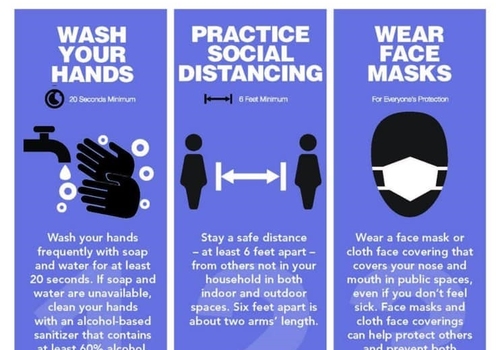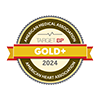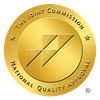
Why you should continue to practice COVID-19 safety precautions after getting the vaccine
Even after getting your two doses of COVID-19 vaccine, you should continue to take actions to help protect those around you until the COVID-19 vaccine becomes more widely available to all.
Wash your hands frequently with soap and water for at least 20 seconds. If soap and water are unavailable, clean your hands with an alcohol-based sanitizer that contains at least 60 percent alcohol.
Stay a safe distance- at least six feet apart- from others not in your household in both indoor and outdoor spaces and avoid crowds when possible. Six feet apart is about two arms’ length.
Wear a face mask or cloth face covering that covers your nose and mouth in public spaces even if you don’t feel sick. Face masks and cloth face coverings can help protect others and prevent both asymptomatic and symptomatic spread of respiratory illnesses like COVID-19.
Not enough information is currently available to say if or when the CDC will stop recommending that people wear masks and avoid close contact with others to help prevent the spread of the virus that causes COVID-19.
Experts need to understand more about the protection that COVID-19 vaccines provide in real-world conditions before making that decision. Other factors, including how many people get vaccinated and how the virus is spreading in communities, will also affect this decision. We also don’t yet know whether getting a COVID-19 vaccine will prevent you from spreading the virus that causes COVID-19 to other people, even if you don’t get sick yourself.
Pandemic fatigue is real, but we all must continue to work together to make our communities healthier and fight COVID-19.
Wondering about the COVID-19 vaccine? Here are some facts about the vaccine from the CDC
COVID-19 vaccination will help keep you from getting COVID-19
- All COVID-19 vaccines currently available in the United States have been shown to be highly effective at preventing COVID-19.
- All COVID-19 vaccines that are in development are being carefully evaluated in clinical trials and will be authorized or approved only if they make it substantially less likely you’ll get COVID-19.
- Based on what we know about vaccines for other diseases and early data from clinical trials, experts believe that getting a COVID-19 vaccine may also help keep you from getting seriously ill even if you do get COVID-19.
- Getting vaccinated yourself may also protect people around you, particularly people at increased risk for severe illness from COVID-19.
- Experts continue to conduct more studies about the effect of COVID-19 vaccination on severity of illness from COVID-19, as well as its ability to keep people from spreading the virus that causes COVID-19.
COVID-19 vaccination is a safer way to help build protection
- COVID-19 can have serious, life-threatening complications, and there is no way to know how COVID-19 will affect you. And if you get sick, you could spread the disease to friends, family, and others around you.
- Clinical trials of all vaccines must first show they are safe and effective before any vaccine can be authorized or approved for use, including COVID-19 vaccines. The known and potential benefits of a COVID-19 vaccine must outweigh the known and potential risks of the vaccine for use under what is known as an Emergency Use Authorization (EUA).
- Getting COVID-19 may offer some natural protection, known as immunity. Current evidence suggests that reinfection with the virus that causes COVID-19 is uncommon in the 90 days after initial infection. However, experts don’t know for sure how long this protection lasts, and the risk of severe illness and death from COVID-19 far outweighs any benefits of natural immunity. COVID-19 vaccination will help protect you by creating an antibody (immune system) response without having to experience sickness.
- Both natural immunity and immunity produced by a vaccine are important parts of COVID-19 disease that experts are trying to learn more about, and CDC will keep the public informed as new evidence becomes available.
COVID-19 vaccination will be an important tool to help stop the pandemic
- Wearing masks and social distancing help reduce your chance of being exposed to the virus or spreading it to others, but these measures are not enough. Vaccines will work with your immune system so it will be ready to fight the virus if you are exposed.
- The combination of getting vaccinated and following CDC’s recommendations to protect yourself and others will offer the best protection from COVID-19.
- Stopping a pandemic requires using all the tools we have available. As experts learn more about how COVID-19 vaccination may help reduce spread of the disease in communities, CDC will continue to update the recommendations to protect communities using the latest science.












